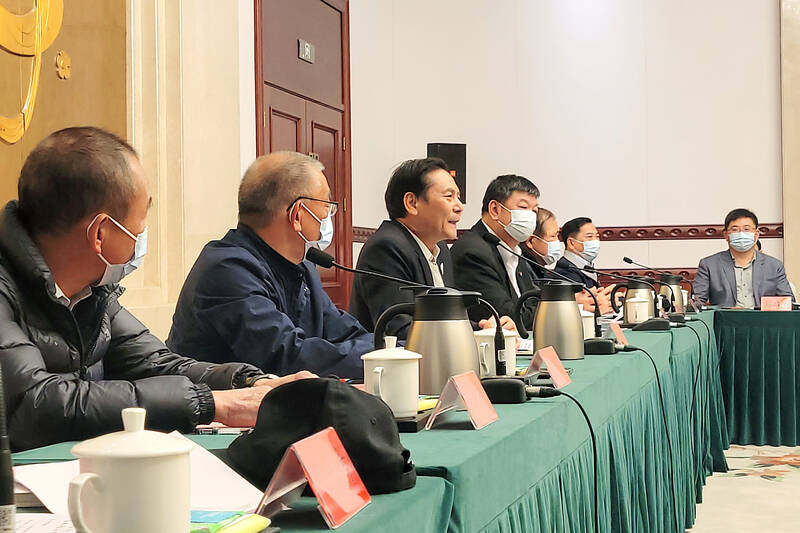A plan by Chinese Nationalist Party (KMT) officials to promote closer economic and political integration between Lienchiang County and China was panned by local residents and Democratic Progressive Party (DPP) politicians.
Joint infrastructure projects and new transportation links were discussed yesterday at a cross-strait meeting between KMT and Chinese officials in Fuzhou in China’s Fujian Province, including building a 27.2km bridge linking Lienchiang — also known as the Matsu Islands — to Fuzhou via Langqi Island (琅岐島) at a cost of NT$600 billion (US$19.5 billion), the Matsu Daily News reported.
The officials also discussed opening for trade and Chinese tourists, the local news outlet said.

Photo courtesy of the Lienchiang County Government via CNA
Led by Lienchiang County Commissioner Wang Chung-ming (王忠銘) and two local KMT leaders, the delegation is composed of 76 businesspeople and local officials representing the county, which comprises 36 islands and islets. Lienchiang County Council Speaker Chang Jung-chiang (張永江) and KMT Legislator Chen Hsueh-sheng (陳雪生) are also attending the annual Cross-Straits Fair For Economy and Trade that is being held from yesterday to Monday.
The three KMT officials agreed to a Chinese proposal to establish “four new links,” which in addition to the bridge, calls for constructing direct pipelines and conduits to supply water, electricity and gas to Matsu, the Matsu Daily said.
The meeting also talked about illegal poaching by Chinese fishing boats, cleaning up marine floating trash, illegal sand dredging and opening up to trade and tourism, it said.
Some Matsu residents said that Wang had posted messages about the meeting, writing in simplified Chinese and seemingly downgrading Lienchiang from a county of Taiwan to a township administered by China’s Fujian Province.
That would be tantamount to surrendering sovereignty to China, they said.
Lii Wen (李問), director of the DPP chapter in Matsu, said that the price tag for the bridge was “outrageously exorbitant” and said it could be a conduit for local government officials to engage in corruption and line their pockets.
“Wang quoted the bridge as costing NT$600 billion, which left most residents dumbfounded at the huge money involved. No matter which government puts up the main funding, it would certainly get siphoned off by corrupt politicians, who would ‘share the loot’ with contractors and businesses affiliated with officials,” Lii said in a post on social media.
He said it was another Chinese “united front” tactic, as Chinese President Xi Jinping (習近平) has espoused the “four new links” for Taiwan’s front-line islands under his “Five Points” policy outline in 2019.
“At that time, Xi already planned to push collaboration and economic benefits for Taiwan’s local governments to achieve his goal of unification with the motherland,” Lii said.
Xi’s plan calls for pushing “four new links” by constructing a bridge and directly supply water, electricity and gas to Matsu and Kinmen islands to promote integration, Lii said.
“In reality, there is not shortage of water, electricity or gas in Matsu and all its islands have set up desalination plants to produce fresh water. There is no urgent need to establish ‘four new links,’ which is a Chinese ‘united front’ tactic to lure people seeking to profit from it,” he wrote.

CAUTION: Based on intelligence from the nation’s security agencies, MOFA has cautioned Taiwanese travelers about heightened safety risks in China-friendly countries The Ministry of Foreign Affairs (MOFA) yesterday urged Taiwanese to be aware of their safety when traveling abroad, especially in countries that are friendly to China. China in June last year issued 22 guidelines that allow its courts to try in absentia and sentence to death so-called “diehard” Taiwanese independence activists, even though Chinese courts have no jurisdiction in Taiwan. Late last month, a senior Chinese official gave closed-door instructions to state security units to implement the guidelines in countries friendly to China, a government memo and a senior Taiwan security official said, based on information gathered by Taiwan’s intelligence agency. The

The National Immigration Agency (NIA) said yesterday that it will revoke the dependent-based residence permit of a Chinese social media influencer who reportedly “openly advocated for [China’s] unification through military force” with Taiwan. The Chinese national, identified by her surname Liu (劉), will have her residence permit revoked in accordance with Article 14 of the “Measures for the permission of family- based residence, long-term residence and settlement of people from the Mainland Area in the Taiwan Area,” the NIA said in a news release. The agency explained it received reports that Liu made “unifying Taiwan through military force” statements on her online

Taiwan Semiconductor Manufacturing Co (TSMC), the world’s largest contract chipmaker, said yesterday that it is looking to hire 8,000 people this year, at a time when the tech giant is expanding production capacity to maintain its lead over competitors. To attract talent, TSMC would launch a large-scale recruitment campaign on campuses across Taiwan, where a newly recruited engineer with a master’s degree could expect to receive an average salary of NT$2.2 million (US$60,912), which is much higher than the 2023 national average of NT$709,000 for those in the same category, according to government statistics. TSMC, which accounted for more than 60 percent

Tung Tzu-hsien (童子賢), a Taiwanese businessman and deputy convener of the nation’s National Climate Change Committee, said yesterday that “electrical power is national power” and nuclear energy is “very important to Taiwan.” Tung made the remarks, suggesting that his views do not align with the country’s current official policy of phasing out nuclear energy, at a forum organized by the Taiwan People’s Party titled “Challenges and Prospects of Taiwan’s AI Industry and Energy Policy.” “Taiwan is currently pursuing industries with high added- value and is developing vigorously, and this all requires electricity,” said the chairman